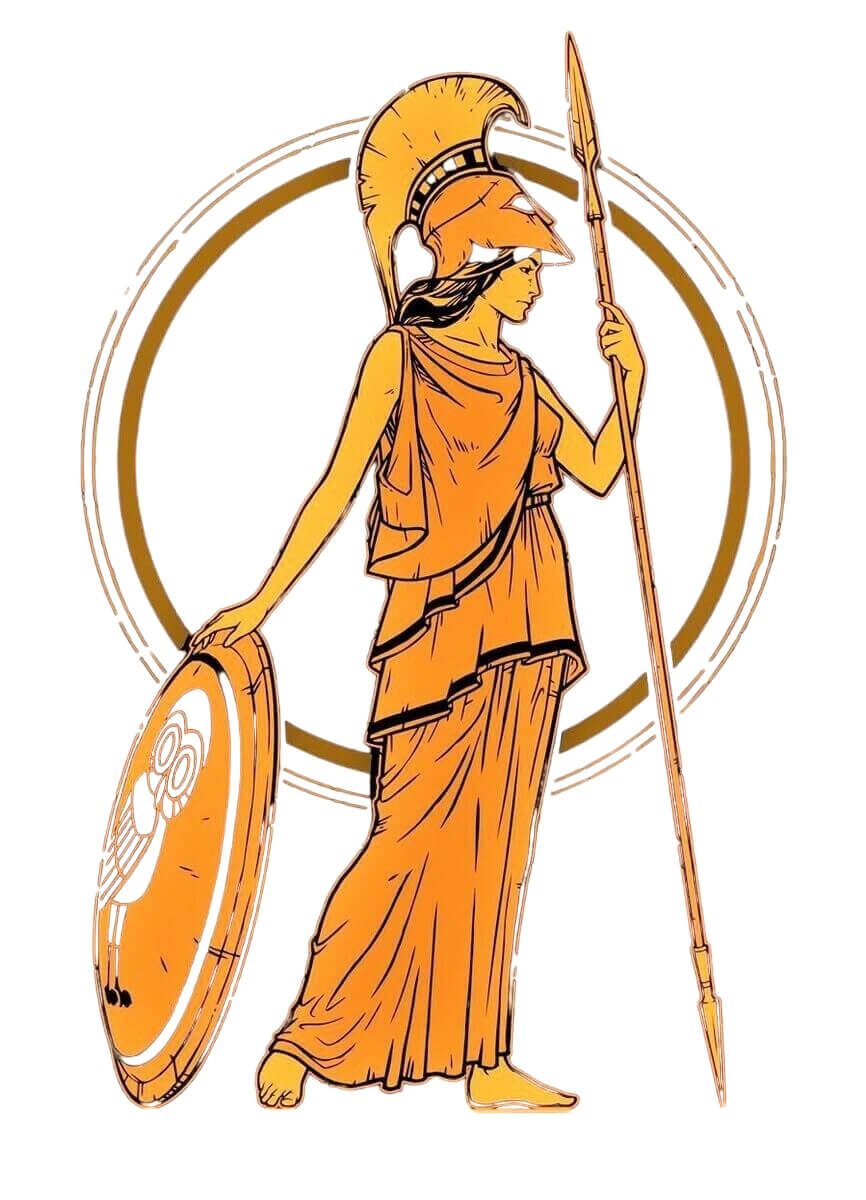Odysseus: The mythic traveller and king
In Greek Mythology Odysseus is the ingenious hero and king of Ithaca, known for his cunning, and endless journey around the seas. After the Trojan War, he was forced to travel all around the Ancient Mediterranean, as a punishment for having blinded the cyclops Polyphemus, the son of Poseidon. The courageous captain had seen many perilous islands and fabled characters, that made him lose his sailors and his precious time for years. Odysseus is also famed for having invented the Trojan Horse, which brought victory to the Greeks, outwitting the Trojans through the use of a sanguinary cunning ploy.
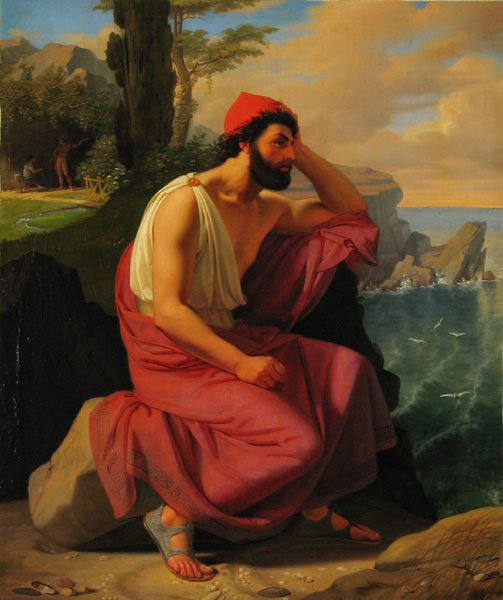
Odysseus and the beginning of his wanderings
The Trojan War ended. Its heroes returned home, famed for their legendary battles and tragic destiny, but only Odysseus did not come back. By the will of the immortal gods he had to wander through the seas for many years. Thereupon he visited many strange cities and countries, having the most perilous adventures of his life.
With the tailwind in his favor, Odysseus sailed from the shores of the burning Troy. He dreamed about reaching his kingdom on the island of Ithaca and rejoin his wife Penelope with his little son Telemachus, whom he had not seen for ten years. But the calm trip did not last for a long time. Zeus sent the northern wind Boreas to Odysseus’ ships. Thus, dark clouds came across the sky, and the inky gloom enveloped everything. A fearsome storm tore apart the sails of the ships and frightened the sailors. However, Odysseus’s crew didn’t die and just had been stunned by the calamity.
The Island of the Lotophagi
The sky cleared and Odysseus realized that they lost themselves in the immense blue of the sea. He decided to move forward at random. For ten endless days he and his crew sailed through uncharted places, which never had been mapped by anyone. However, the captain and his sailors managed to anchor nearby an unknown island a time afterwards. The peaceful race of people, named Lotophagi inhabited the idyllic place. They ate the fruits and flowers of the lotus tree. It resulted to be a narcotic plant and the main source of food on the island. Thus, it made all its eaters to remain in a peaceful oblivion.
The Lotophagi gave food to Odysseus’ sailors, who went to inspect the area. Thereupon, the Greeks forgot everything about the purpose of their travel, and decided to stay on the island forever. However, Odysseus managed to return his crew to the ships with difficulty and shortly afterwards they quickly set sail from the island.
Odysseus and the island of the Cyclopes
Once again Odysseus and his crew saw land ahead. It turned out to be two islands, a big one and a smaller. The brave Greeks docked on the smaller one and settled down for the night.
However, the king of Ithaca became curious: which secret had hidden the big island? Therefore, he left his eleven ships at the bay and crossed the strait on the twelfth vessel to explore the unknown territory. Shortly afterwards Odysseus and his sailors found out a huge cave on the big island. Someone enormous and strong lived there. It was surrounded by a fence of huge stones, and inside there stood baskets of cheese and huge vats of sour milk. The Greeks also found pens for sheep and goats.
Without realizing it, Odysseus and his companions stumbled onto the dwelling of a huge Cyclops named Polyphemus. He and other Cyclopes inhabited the island. As a matter of fact, they lived in different caves, raising cattle and disobeying the laws of Zeus and man. Polyphemus was the most ferocious and angry of all the terrible giants.
In Polyphemus’ cave
While Odysseus and his sailors were looking around the cave, heavy footsteps had sounded by the entrance. The fearsome owner of the place had returned. He drove his herd into the cave, closed the entrance with a huge stone and after it managed to see the uninvited guests with his only eye.
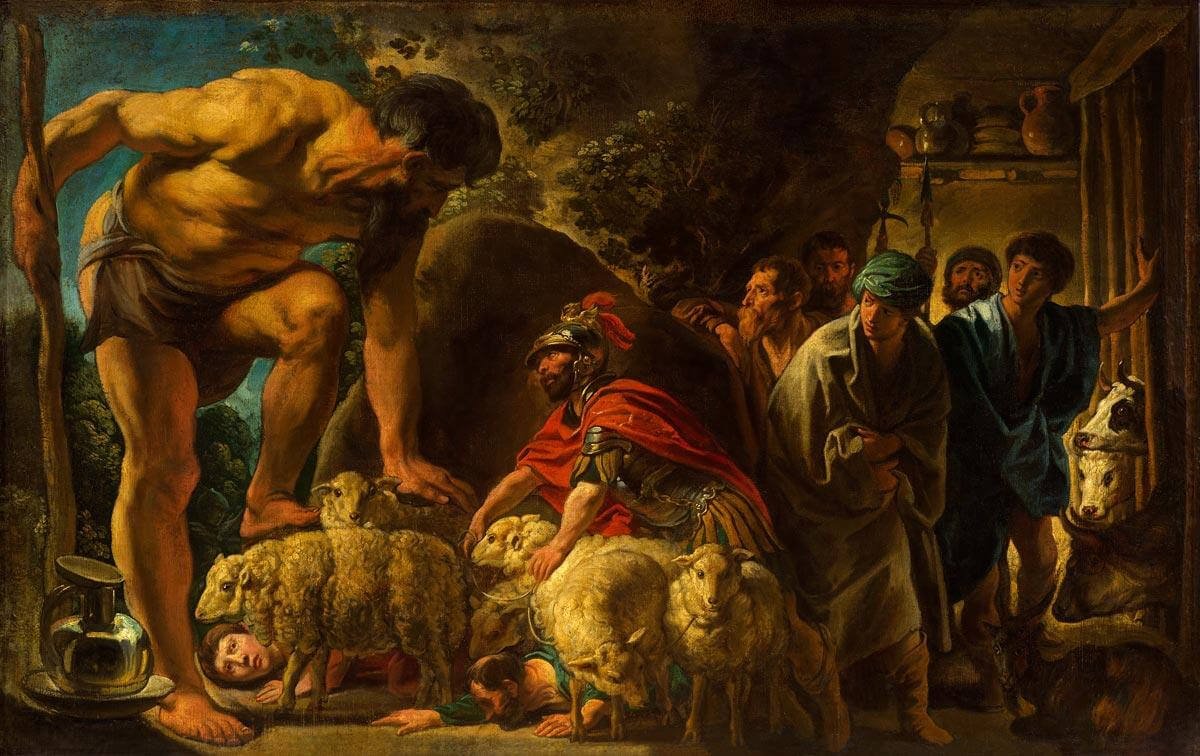
“Who are you and where have you come from?” – Polyphemus asked in a thunderous voice. “We were brought here by the storm,” answered Odysseus. “We are Greeks by birth, and we are sailing from Troy to our homeland. If you honor Zeus, you will not offend the wanderers.”
“I don’t care about Zeus, I’m not afraid of his wrath!” – roared the cyclops.
He grabbed two of Odysseus’ companions, and killed them with a blow against the ground. After it he boiled them in a huge cauldron and ate them with great appetite. When the monster finally ended his terrible dinner, he fell asleep on the ground, and didn’t care about the rest of the Greeks.
Odysseus drew his sword and wanted to rush at the cyclops, but suddenly realized that he and his crew couldn’t remove the huge rock that covered the entrance.
Odysseus’ cunning plan
The night passed fast. In the morning, Polyphemus ate two more Greeks and left the cave. But Odysseus had already figured out how to defeat the Cyclops. There was a huge log in the cave. As it seemed Polyphemus wanted to make a club out of it. The hero of Troy sharpened the end of the log and hid it. Thus, by the time when Polyphemus had returned, he approached him, offering a cup of wine.
The Cyclops did not know what the wine is, so he accepted the gift and drank it with great pleasure. One cup after another… After the third cup, Polyphemus became tipsy. “Give me your name, I want to give you a present in return!” – he demanded. “My name is Nobody,” Odysseus answered him. “Know, then, oh, Nobody, that I will eat you at the very end of my sumptuous repast! That will be my gift to you!” – laughed the Cyclops, and fell to the ground beginning to sleep immediately.
Odysseus and his companions were waiting for it. They picked up the log, crept up to the Cyclops and punctured his eye with the sharp end. Polyphemus howled wildly and called for help. Another Cyclopes ran to his cave, asking: “What is wrong with you, Polyphemus? Who has hurt you?” “Nobody,” roared the blinded giant. – “Well, if no one hurt you, stop shouting and disturbing your neighbors!” The angry Cyclopes scattered to their caves and did not come anymore.
Odysseus escapes Polyphemus
Odysseus thought of a way to slip out of the cave. When the Cyclops was letting the flock out in the morning, the Greeks tied themselves under the bellies of the goats and the animals carried them out of the terrible place. In a moment they reached their ship, they hoisted the sails. Odysseus wanted to boast about his feat, so he began to tease Polyphemus and reveled his real name.
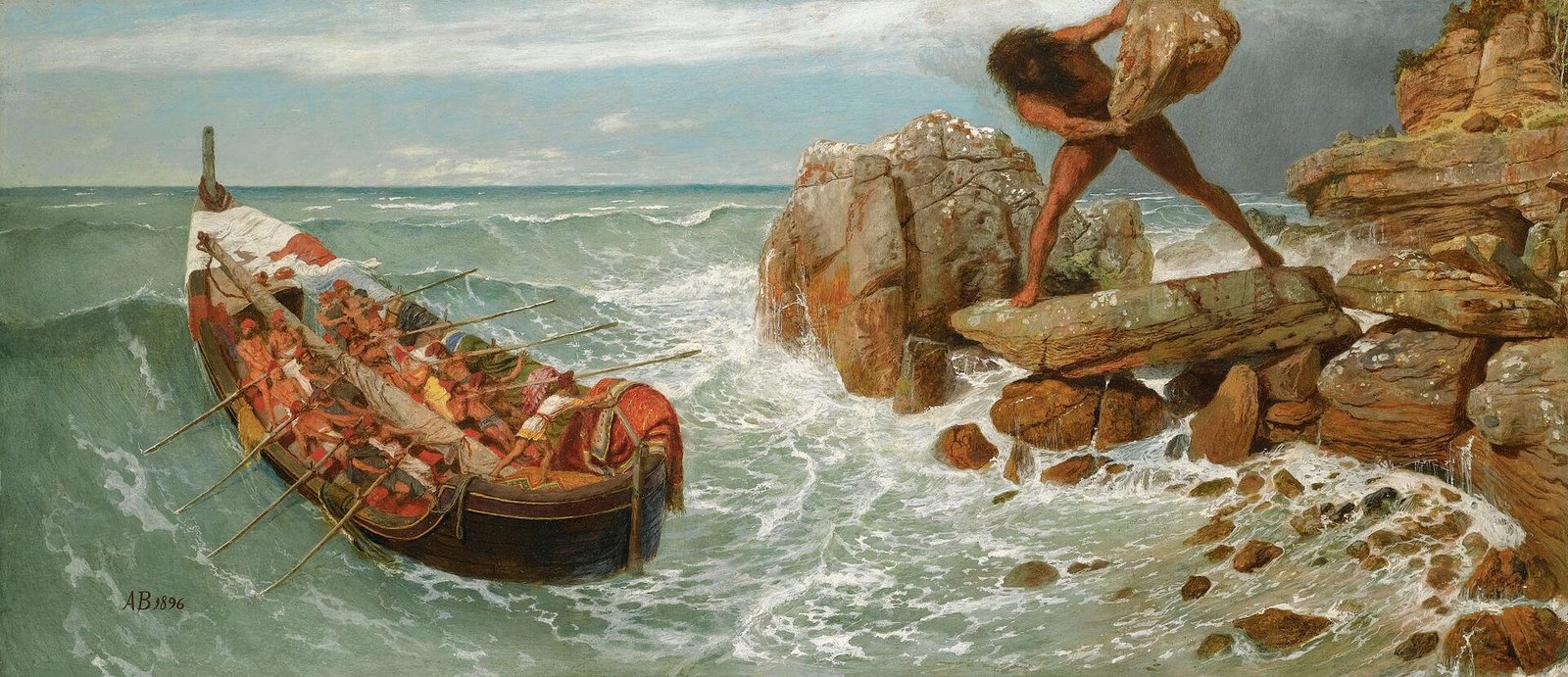
By the time the giant heard his voice, he broke off a huge piece of rock and threw it in the direction where the cry was coming from, but did not manage to sink the ship. Polyphemus howled with anger and begged his father, Poseidon, to punish Odysseus, so that he would never return home. But the legendary hero was already far away. He had safely rejoined his crew on the bay of the small island.
The floating island of Aeolus
Soon afterwards, Odysseus arrived at the island there dwelled Aeolus, the king of the winds. This island floated on the sea, surrounded on all sides by an indestructible bronze wall. The king of the winds welcomed the Trojan hero warmly, and the sailors stayed in his place for a month. At the moment of farewell, Aeolus gave Odysseus a large leather sack, tied with a silver twine. He strictly forbade the hero to untie it, until he landed on his native Ithaca.
Thereupon, the further part of the journey from the island of Aeolus was easy. A tailwind was blowing all the time, and Ithaca was getting closer and closer. The shores of the island had already appeared in the distance, but something terrible happened.
Meanwhile Odysseus slept, his sailors began to talk about the rich booty and gifts, that their captain used to receive from his new acquaintances. They felt upset and greedy about his luck and decided to untie the sack, in order to see its contents. At the same moment they did so, all the winds burst out of it at once. Aeolus wanted to abate the travel of Odysseus and his crew, thus he enclosed all the winds in the bag, leaving free only the tailwind!
For that reason, a terrible storm arose on the sea, the ships flew up on the waves almost to the sky and then again fell down into the dark abyss of the ocean… Odysseus resigned himself to his fate but did everything to survive. He wrapped himself in a cloak and laid down in the stern of his ship.
Odysseus and Laestrygonians
For a long time, the ships had been whirling on the sea. When the storm calmed down, the Greeks saw, that once again the sea had thrown them to unknown places. But by a strange twist of fate, all the twelve ships remained intact.
Odysseus and his crew sailed for another tiring six days. A time after, they discovered a sunny, luxuriant island on the far side of the sea. Eleven ships approached and anchored in its narrow bay, which looked very peaceful and inviting at first sight. Only Odysseus left his ship in the open sea, not far away from the entrance to the bay.
In fact, his caution kept him alive, since the island was inhabited by the Laestrygonians – a savage tribe of man-eating giants. They pelted the ships with huge stones and killed many sailors. Afterwards they strung them on stakes and carried their corpses to the island’s main town to roast and devour their flesh. By the time it happened, Odysseus felt heinously threatened. He cut the ropes of the anchors (baskets with stones) and got out to the sea. Now he had only one ship left.
Odysseus and Circe
Odysseus’s ship sailed for a long time through the boundless sea, reaching by chance the strange island of Aeaea. By the time the sailors anchored the ship in the bay Odysseus took his spear, girded himself with a sword and went to see the island. From a high cliff he descried a thin puff of smoke, rising from the middle of the island’s forest. Thereupon he decided to be cautious but find out who lived there.
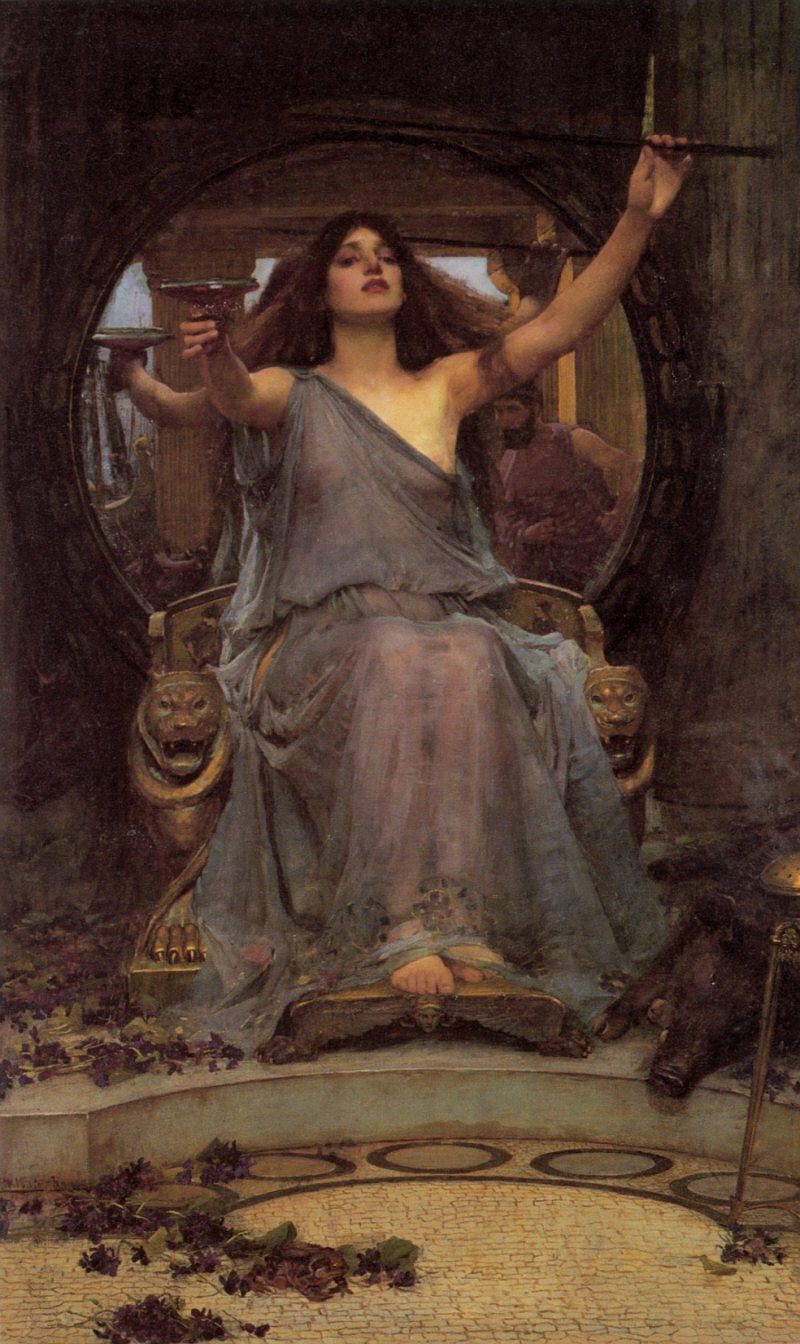
The king of Ithaca returned to the ship, and divided his companions into two detachments. He led one of them by himself, and entrusted the other one to his second-in-command, called Eurylochus. Taking twelve men with him, Odysseus’s officer set out on his journey and reached quickly a strange beautiful palace in the middle of the wood. It was hidden by a lush, exuberant foliage, blossoming trees and blooming flowers.
Near the strange palace the sailors bumped into docile lions and wolves, which began to demand their caresses like dogs, that met their owners after a long farewell. On the other hand, from the palace itself came a wonderful singing, that lured the crew inside. A beautiful woman, named Circe, had met the men of Odysseus in the interior.
Afterwards she invited them to a sumptuous fest with a wonderful pottage of cheese, meal and wine. The sailors could not refuse such a repast and accepted the invitation. However, after having eaten a certain part of pottage, they turned into swine. Insofar as Circe poisoned the meal with her magical potion, she had created for this only purpose. Eurylochus, who did not taste the meal, became terribly scared after it and rushed back to Odysseus, informing him about the perilous sorcery he just had witnessed.
Hermes helps Odysseus
When the king of Ithaca became aware of the mishap, which victimized his sailors, he went to the palace himself. On his way through the dense wood, the god Hermes, sent by Athena, appeared before the hero and warned him about the terrible danger. He gave Odysseus a magical herb, supposed to protect him from Circe’s sorcery and explained him how to cope with the enchantress.
As it follows in the legend, Odysseus obeyed the instructions of Hermes. He used the herb and avoided being transformed into an animal inside the palace. He did not hesitate for a moment and had attacked Circe with his sword, making her fall in love, as expected.
Thereafter, the beautiful witch agreed to free the sailors and turned them back into men. In regard to Odysseus, he had become her lover and stayed on the island with his crew for a whole year.
After having lived the whole year with Circe, Odysseus became distressed about his failed travel to Ithaca. For that reason, the enchantress did not want to retain him anymore. She advised him to descend into the gloomy underworld and ask the soothsayer Teiresias about his fate. Odysseus needed to know how to placate the gods and manage to come back home. Therefore, Circe had explained him how to make his hazardous journey.
Odysseus in the underworld
Afterwards, in the cheerless realm of the dead the king of Ithaca met the shadow of his mother, and the shadows of his comrades-in-arms, who fell under the walls of Troy – Achilles, Patroclus and Ajax. He felt surprised when he descried the king Agamemnon between the dead. It turned out that his own wife murdered him after his return from Troy.
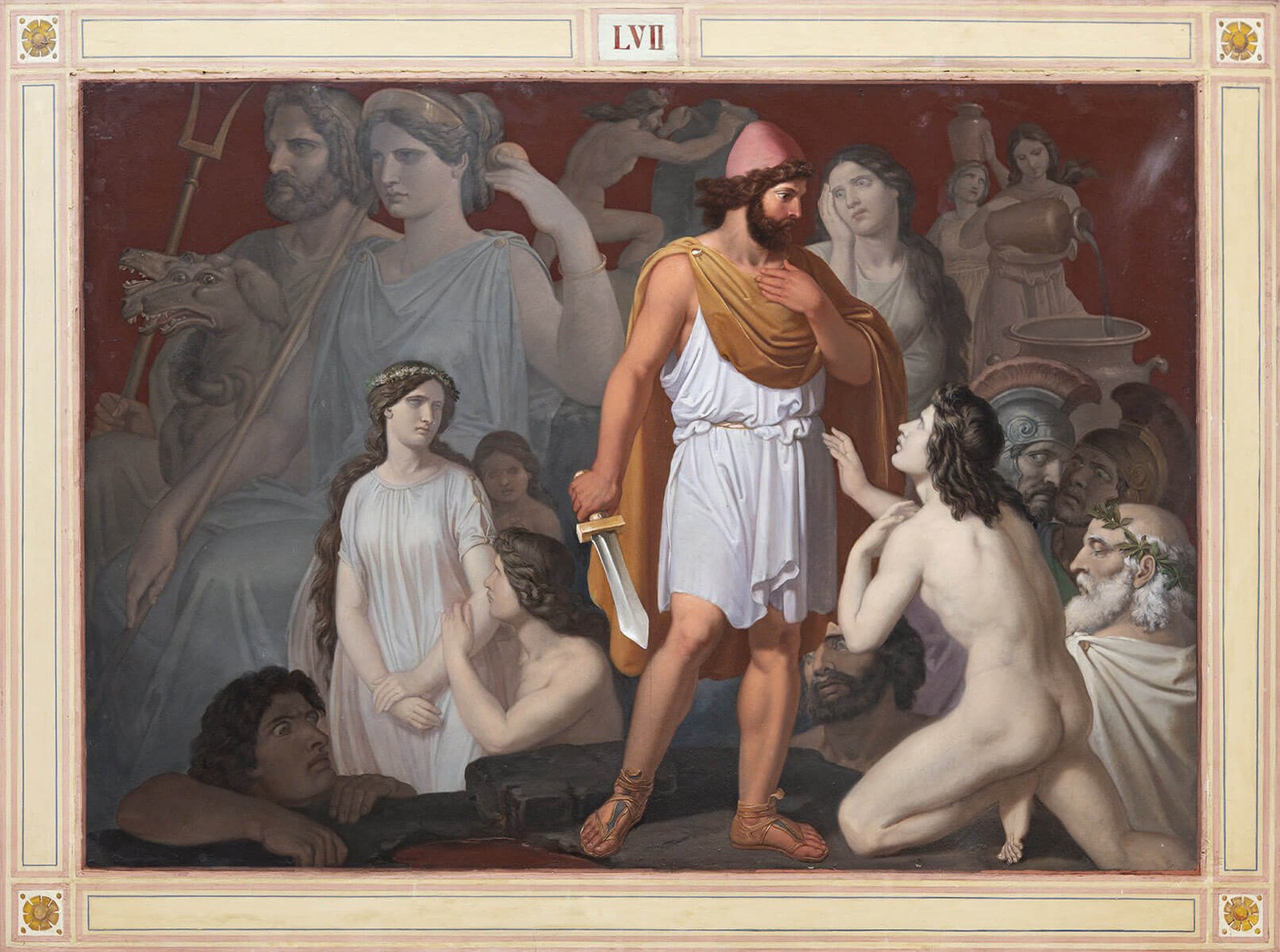
A time after Odysseus found the shadow of Teiresias, whom he needed to ask for guidance. It answered him, that Poseidon became angry, because he blinded his son Polyphemus. However, the king was foretold to reach his homeland, if his sailors spare the bulls of Helios on the island of Thrinacia.
When Odysseus had returned to Circe, she had also advised him about two different maritime routes to Ithaca and warned him about the dangers he would be encountering on his way home.
Odysseus and the sirens
Odysseus knew from Circe’s words that he would be passing near an island, where lived the malignant Sirens. Half-women half-birds, they always tried to kill the seafarers. With sweet-sounding songs, they lured sailors to their island and tore them apart with their sharp claws. No man had ever escaped alive from these terrible creatures.
In order to save his crew Odysseus commanded the sailors to plug their ears with beeswax, so they couldn’t hear a thing. Meanwhile he also demanded them to fasten him to the mast with the strongest ropes. In addition, the sailors needed to deny all his requests to be untied.
Thereupon, the ship sailed swiftly past the island, and strange alluring songs began to be heard from it. Odysseus was bewitched and enthralled by the singing of sirens, trying to escape from the ropes. He behaved like a madman and demanded his companions to release him. Nonetheless they pulled even harder on the oars, and untied the captain when the terrible island disappeared from their sight and the singing was no longer heard.
Why didn’t Odysseus stuff his own ears with wax to resist the call of the sirens?
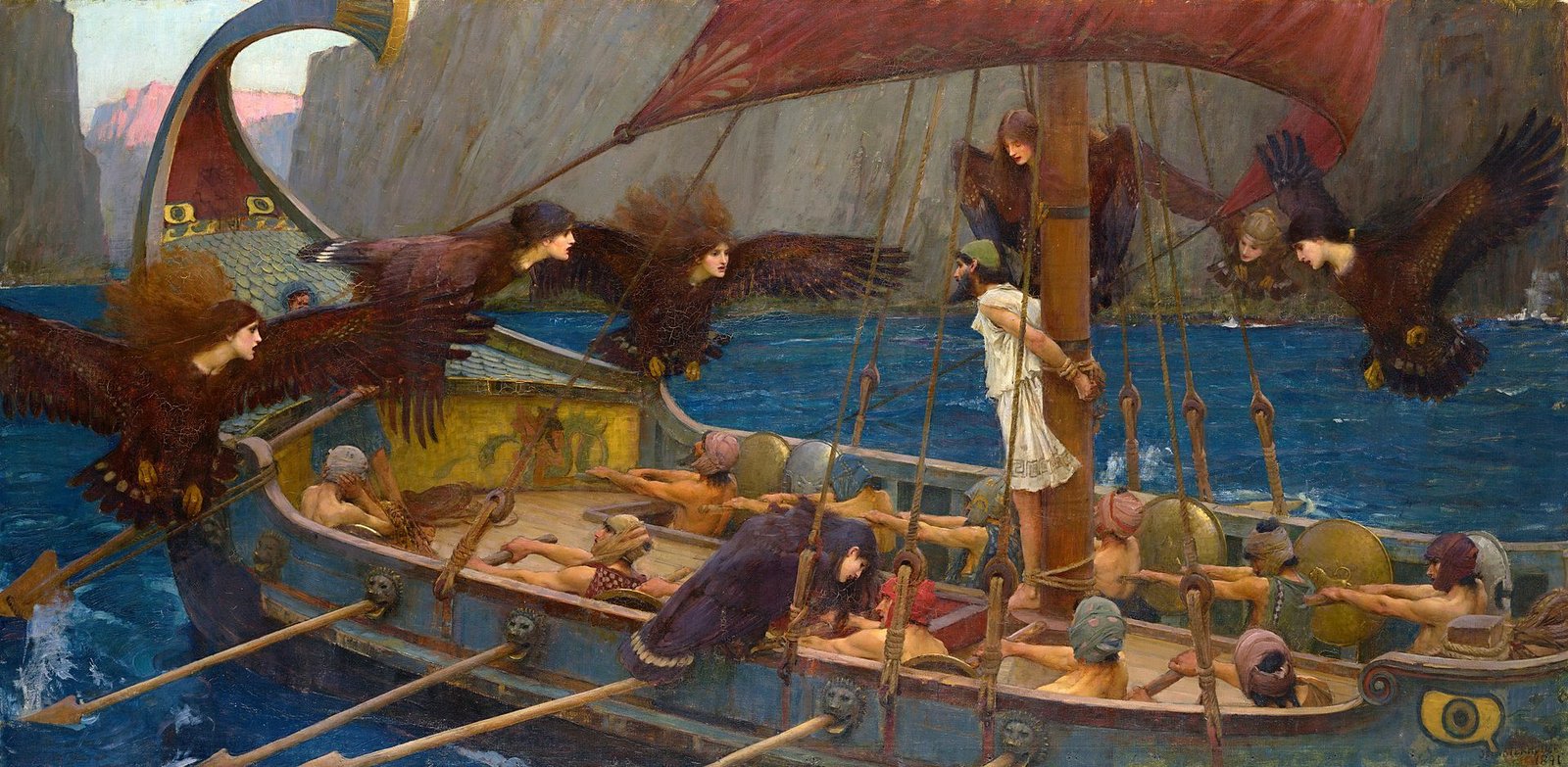
Odysseus acted like a kind of vile siren for Achilles at the beginning of the war with Trojans. He persuaded the hero to join the useless war of Troy, and Achilles did not only perish, as prophesied, but also joint the gloomy realm of the underworld, instead of Elysium. Thereupon the great wanderer had an opportunity to speak with the shadow of Achilles in Hades and regretted his infamous cunning.
Odysseus had also invented the Trojan horse, and it served as another treacherous siren for the good men to die. All along his life, the leader of Ithaca obeyed the foolish orders of glory and never followed the way of honor as a real hero. Thus, he did not deserve Elysium.
On his way back, Odysseus just had defended himself and his sailors in a terrible world, which never cared about anyone. Nostalgic rapture of a long adventurous journey possessed his lonely soul, and he feared to become allured by the charm of the boundless sea, as the spirit of forever gone youth, which never would be happy in Ithaca.
Odysseus wanted to test himself and pay his debt to the way of honor. To hear the real sirens and understand, he was not one of them. Perhaps he craved to recover his previous serenity and clear his mind from sadness, apathy and misfortunes.
Certain post-Homeric authors affirmed, that Odysseus put his head under such a danger, because the sirens would die, if someone managed to escape from them. Therefore, Odysseus killed the monstrous creatures or prevailed over them, paying his debt of honor to this great something, that without being a siren, allures the best warriors onto the lonely and amazing path of death and freedom.
Scylla and Charybdis
The ship sailed on calmly, but even a greater danger awaited Odysseus and his crew. The ship had to pass through a narrow channel between two rocks. On one of them, lived the monstrous Scylla. It was a creature with six canine heads and three rows of sharp teeth in each mouth. Even more terrible resulted to be another side of the strait. Charybdis, the horrible sea monster, lived under a rock and created a terrible whirlpool three times a day. Many ships ended being devoured by her dreadful mouth.
That being so, Circe advised Odysseus to pass near Scylla, since it was safer to lose some sailors, than risking to wreck the entire ship.
With this in mind, Odysseus followed the advice of Circe. By the time they passed nearby Scylla, she grabbed six of Odysseus’ companions and killed them in a single moment. However, the terrible strait stayed behind, and the mirthful sea was welcoming the heroes again.
One month on the island of Thrinacia
Odysseus did not want to stop at the island of Thrinacia, remembering what Tiresias warned him about. But his crew demanded a worthy rest on solid ground, and he had to yield to their request.
The hero and his sailors moored the ship in the bay of the island and spent one night, taking shelter. Afterwards, in the morning a terrible storm had begun, and the Greeks couldn’t go to the sea. The winds blew for a month. Odysseus and his sailors lost all their supplies. Thus, hunger tormented them day after day. However, the hero forbade strictly to touch the bulls of Helios, and no one dared to disobey his order.
Even though, one day when Odysseus woke up, he felt the smell of roasted meat and realized that his companions condemned themselves to death. He became especially convinced by the terrible sign sent from Olympus. The hides of the bulls began to move as if they were alive, and the meat was making a pitiful mooing sound.
Soon afterwards, Odysseus and his crew were able to retake their journey and sailed out of the island. Nonetheless as soon as the place stayed out of sight, Zeus punished the captain and his crew, gathering heavy clouds over their ship.
The wind howled, and the mast broke like a cane. The lightning flashed – and only splinters were left of the ship. Odysseus managed to grasp a fragment of the mast, and resigned to his fate, carried away by the waves. Nine days later, the boundless sea, washed him up on the shore of some beautiful new island.
Odysseus and the nymph Calypso
The land, there Odysseus found shelter, turned out to be an island. It was called Ogygia and it belonged to a nymph named Calypso. She lived in a grotto, covered with luxuriant grapevines and ripe bunches of grape. Four springs with crystal-clear water flowed near the grotto and vivid dense forests, inhabited by singing birds had grown around it. Calypso looked so beautiful as her astonishing domain. She welcomed Odysseus with hospitality: she gave him rich clothes, sumptuous food and tasty beverages.
Calypso liked Odysseus so much, that they became lovers, and she wanted him to remain on the island forever. For that reason, she enchanted the seafarer with her sweet songs and made him forget about time and his homeland. Calypso demanded Odysseus to be her husband, offering him immortality and eternal youth in exchange. However, the captain never stopped missing Ithaca and refused her offer. He went to the shore every day, looking at the sea and crying.
Therefore, his patroness Athena asked Zeus for help and he sent Hermes to convince Calypso to free the hero. As a matter of fact, the nymph helped Odysseus with his journey. She provided him the tools to make the boat and showed him there to chop down the trees for the boatbuilding.
Poseidon’s wrath
Four days later Calypso supplied Odysseus with provisions for the travel and gave him a tailwind in help. Thereupon and during eighteen days the hero sailed the sea with success. However, Poseidon had finally descried him travelling and stroke the waters with his trident.
Huge waves surged from nowhere and the wildest winds came from all sides. The boat was destroyed and Odysseus suffered a shipwreck near the land of the Phaeacians. Shortly afterwards, Athena calmed the sea and helped him reach the shore. Then again, she visited the princess Nausicaa, while she was sleeping and ordered her to go to the seaside to wash her clothes.
That being so, the next morning the young princess went to the sea coast with a group of youthful maidens. After having washed their clothes the girls played merrily, and woke up Odysseus with their screams. Covering himself with branches, he came out of the shelter. From head to toe he was covered with mud and seaweed, so the girls ran away in fright, and only Nausicaa did not flee. She ordered her servants to give Odysseus clothes, food and drink and afterwards invited him into her father’s palace.
Very soon Odysseus found himself in the palace of Alcinous. The king treated him very kindly and promised a ship for his further trip. In the meantime, he arranged a sumptuous feast in honor of his new guest. Alcinous noticed that Odysseus did not want to tell his name and didn’t press him to reveal it.
Odysseus and the king Alcinous
The feast was merry and blithe. The blind singer Demodocos sang a song about the glorious exploits of the Greeks under Troy. He sang about the dead heroes, and the cunning Odysseus, who had invented the wooden horse… The guest listened to him as if mesmerized. He remembered his former glory, and tears sprang from his eyes. Alcinous noticed him crying and asked about his origins. “Who are you, stranger? Why are you shedding bitter tears? Perhaps a friend or relative of yours died at Troy, and you are grieving for them?”
Odysseus couldn’t hide he was the king of Ithaca anymore; the whole night he had been telling his long story. The next morning, the king Alcinous ordered his people to equip a ship for the hero, and loaded it with rich gifts. Faster than the wind it rushed along the sea waves, and at the early dawn of the next day the shores of Ithaca appeared on the horizon. Odysseus woke up after a long sleep when the ship approached his native shores. The Phaeacians left him gently on the shore and set off on their way back.
But Poseidon became angry with them for bringing Odysseus home. The island of the Phaeacians was close to Ithaca, but their ship was not destined to reach it. Given that Poseidon turned the Phaeacian ship into a rock – that resulted to be the vengeance of the fearsome god.
Odysseus on Ithaca
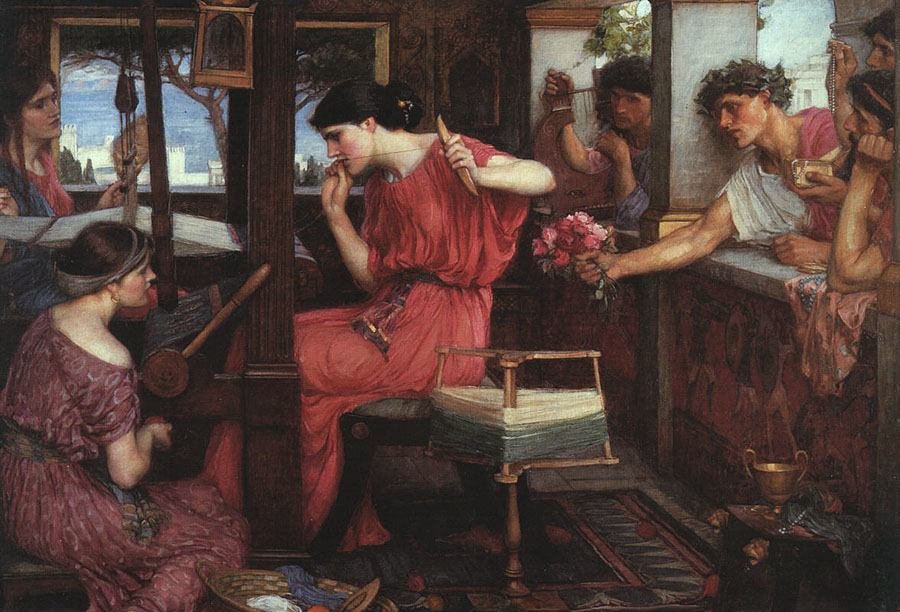
Penelope, suitors, and the veil
For twenty years Odysseus didn’t live at home. Ten of them he fought under the walls of Troy and ten of them he wandered through the boundless seas and lived with the nymph Calypso. His son Telemachus grew up during this time, becoming a strong twenty-years-old young man. Penelope, Odysseus’ wife, waited patiently for her husband to return, however a huddle of suitors pursued her all along this time. They came to Ithaca’s palace and demanded the queen to make a choice and marry one of them. Inasmuch as they thought, that Odysseus would never come back from his endless journey.
The suitors looked very different and had their own virtues and vices. They came from the best families of Ithaca and neighboring islands, persistently seeking Penelope’s answer. They not only enjoyed her astonishing beauty, but also hoped to gain royal power in Ithaca. At first, the queen refused them all, affirming that Odysseus was alive and a reliable oracle had predicted his return.
Later, when the suitors became very insistent, she told them, that she would make her choice, after having finished the weaving of a special blanket. Thereupon for several years Penelope weaved the bedspread during the day, and in the evening unlaced the work. All this time the suitors lived in the palace of Odysseus. They drank his wine and ate the meat of his pigs, sheep and cows, disposing of his property and servants as their own.
Telemachus tries to find out about Odysseus
Meanwhile, Telemachus had grown up and began to hate the swains. He didn’t like the behavior of uninvited guests in his father’s house, but couldn’t adopt any harsh measures. For many years Telemachus hadn’t heard any news from Odysseus. Thus, he decided to find the former companions of his father and learn something about his whereabouts.
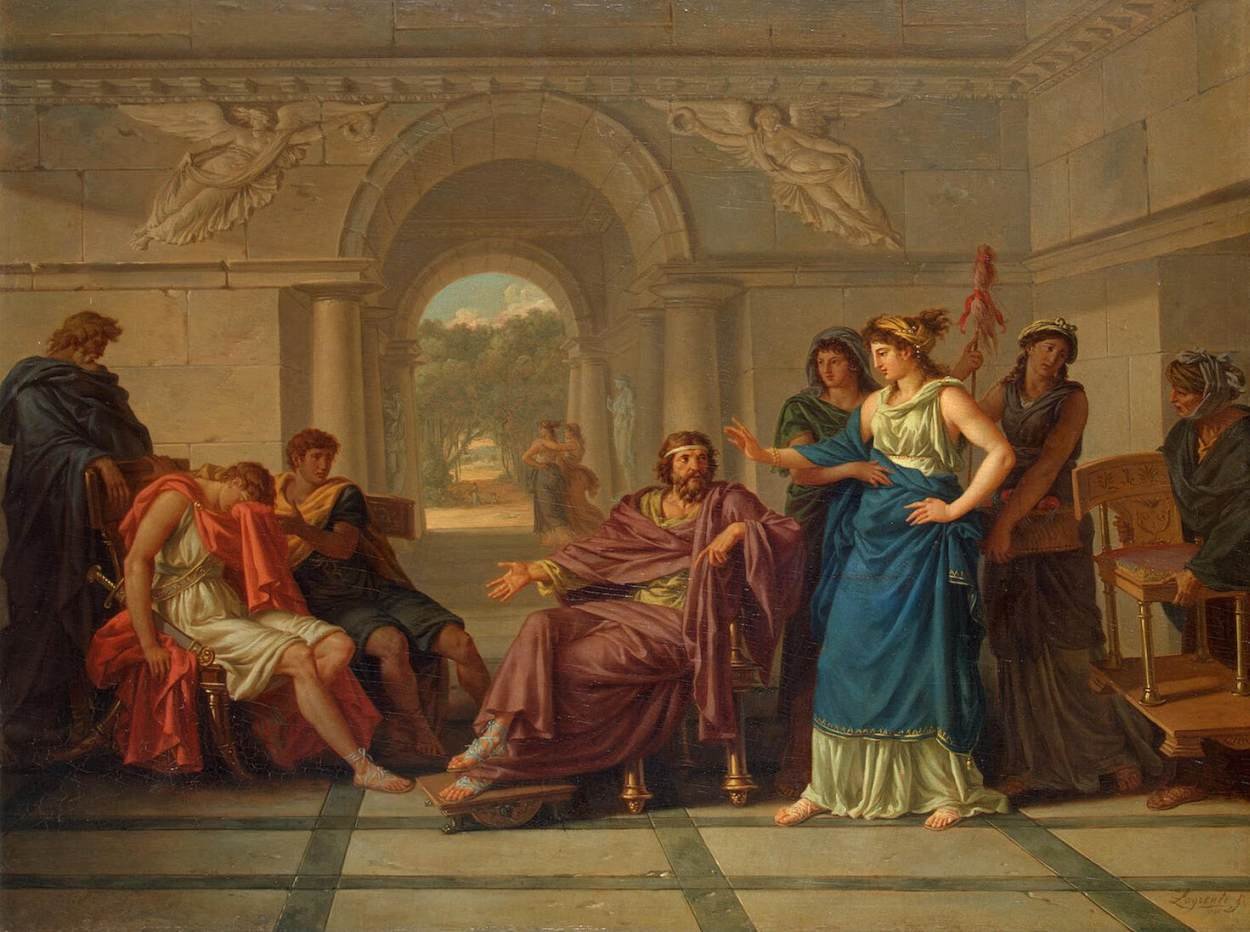
Therefore, the prince of Ithaca equipped a fast ship, gathered a fearless crew and went to the sea. In the first place, he visited the wise king Nestor, who ruled the island of Pylos. Nestor knew nothing about Odysseus’s fate and advised the prince to speak with Menelaus. Soon afterwards, Telemachus made a long travel to Sparta and discovered rumors which pointed out, that Odysseus had been languishing on the island of the nymph Calypso.
Athena helps Odysseus
When Odysseus woke up, he did not recognize Ithaca. Everything around was covered with a thick fog. In despair, he thought that the Phaeacians had deceived him and landed him on some unknown shore. But suddenly he saw a handsome young man walking along the seashore. He assured him to be on Ithaca. Odysseus rejoiced at his arrival, and the young man suddenly changed his appearance, turning into the goddess Athena. She suggested Odysseus to hide his real identity to the inhabitants of Ithaca at first.
With these words she turned Odysseus into an elderly beggar, so that no one could recognize him. Afterwards she instructed the hero to visit Eumaeus, his old servant and swineherd.
By the time Odysseus did so, Eumaeus didn’t manage to recognize him, although he served him his whole life. The legendary hero composed a whole false story about himself and finished saying, that the king of Ithaca was about to return home with rich, amazing gifts.
Odysseus and Telemachus
Odysseus spent the whole night in Eumaeus’ hut. In the morning, Telemachus, who had returned from his wanderings, came to speak with the swineherd and saw Odysseus. Meanwhile Eumaeus had to go to the city, Athena returned to the hero his true image. He looked strong, majestic and young. Telemachus felt frightened: he thought that one of the immortal gods appeared before him, but Odysseus calmed him down.
He told Telemachus about his adventures and inquired him about everything that happened on Ithaca during his long absence. When Odysseus heard about the suitors’ outrages, his heart was filled with anger. The king of Ithaca decided to take revenge on them.
“This is impossible, father! – exclaimed Telemachus. “There are more than a hundred of suitors, and there are only two of us!” “That’s all true, my son,” answered Odysseus. “But we have a great helper with whom the mortals cannot fight – the invincible goddess Athena.”
After such a conversation, son and father agreed, that Telemachus would go to the city alone in the morning. A certain time after, Odysseus would come there with Eumaeus. That being so, Athena turned Odysseus into a wretched beggar again.
Odysseus disguised as a wanderer
Leaning on a stick, Odysseus slowly walked towards his palace. He walked over and sat down at the very entrance, bending down against the door. Telemachus descried him from inside and sent him bread and meat. Thereupon Odysseus ate with hunger, and approached the suitors afterwards, beginning to beg. Everyone gave him something and only the cruel Antinous refused his request and tried to beat him with a chair.
However, as soon as it happened, Penelope stopped the fight, saying that she would not tolerate such a kind of brutal behavior in her own house. Thereupon, Odysseus stayed at the feast until evening, receiving table scraps and watching the drunken suitors run amok. His heart became inflamed with terrible anger, but he restrained his emotions, obeying the will of Athena.
Conversation with Penelope
In the evening, when the suitors fell asleep, Odysseus and Telemachus removed all the weapons from the banquet hall. They took them to the pantry and locked them inside. The hero wanted to sleep, but Penelope and her maids entered the hall. The mistress of the island sat down next to the beggar and began asking, if he met by chance her husband during his wanderings. Odysseus felt happy to tell her, that the man she was waiting for was once his guest and would be coming home in a less than one year.
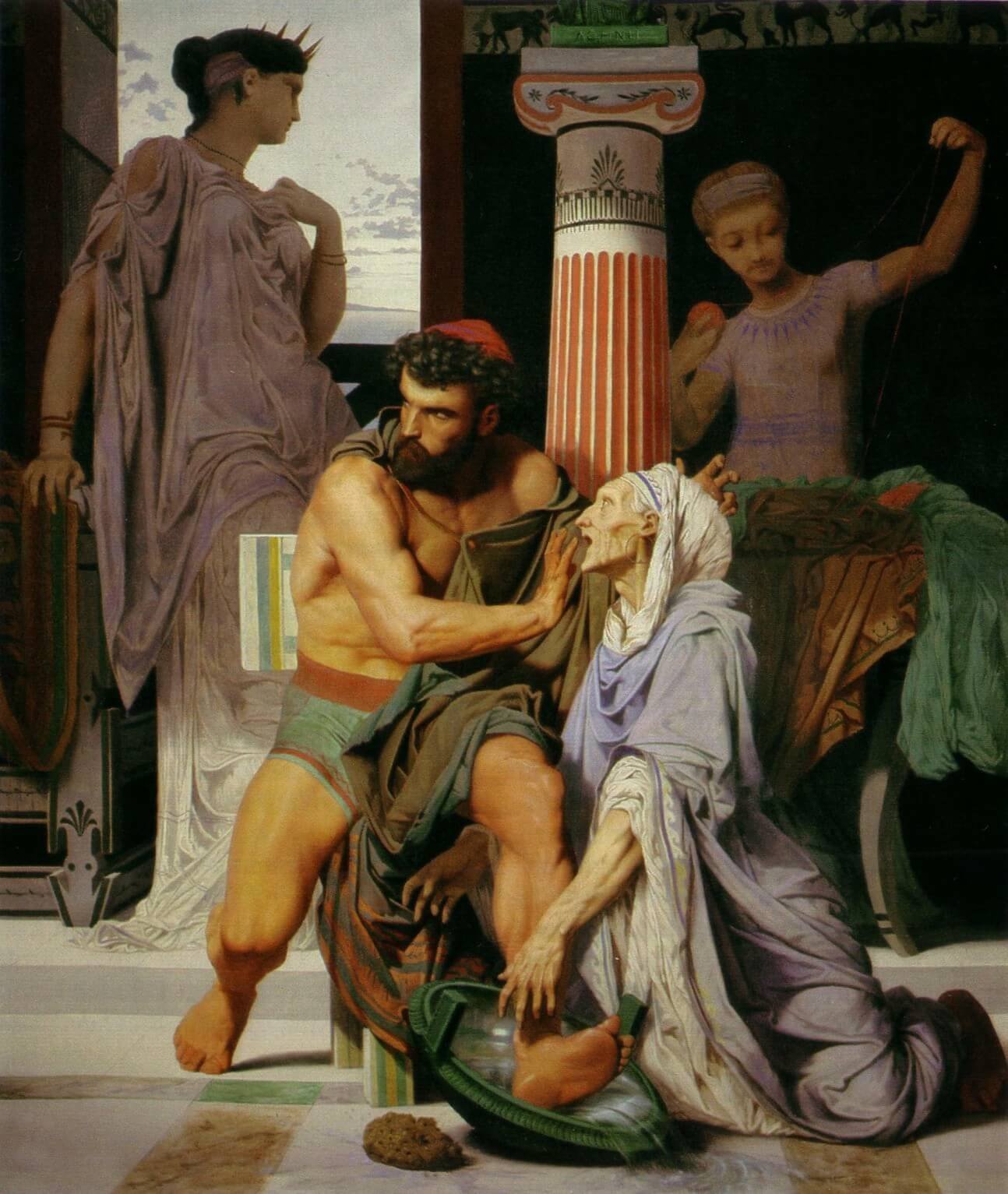
Penelope felt gracefully flattered and ordered the maids to prepare a soft bed for the wanderer. Therefore, Eurycleia, Odysseus’s old nanny, brought water in a basin and began to wash his feet. By the time she was doing so, she noticed a scar on his leg, and recognized him as the king of Ithaca. Insomuch as, once in time he got wounded by a boar, while hunting. Out of excitement, Eurycleia knocked over the basin of water. She wanted to call Penelope, but Odysseus asked her to remain silent and keep in secret his identity. Because it could be too dangerous.
Penelope announces her decision
The morning had come. The suitors appeared in the banquet hall, sat down at the tables and began their feast. Odysseus stood in the hall as well, disguised as a wanderer, thus the suitors subjected him to insults again. The frantic cries of the feasting swains could be heard so far as in Penelope’s chambers.
All of a sudden Penelope entered the hall. She held Odysseus’s bow in her hands. “Listen to me! – she said. – I decided to make my choice. Whoever strings this rigid bow and manages to shoot an arrow so that it crosses through the twelve ax heads, I will marry him!” She knew that only her husband could handle the bow in such a way. Thus, she relied on the impossibility of the task and craved to end with the whole mess at once.
Thereupon the suitors took the bow one after another, but none of them was even able to string it. Odysseus, disguised as a beggar, asked them to try his hand. However, the suitors disparaged him in a very ignoble way and he wouldn’t have received the bow, but Penelope intervened and allowed him to take part in the contest.
Odysseus takes revenge on the uninvited suitors
Odysseus took the bow in his hands and examined it carefully. Afterwards, in just one movement, he bent the bow and pulled the string. A terrible weapon laid in the hands of the hero; the bowstring rang menacingly, and the suitors turned pale. Odysseus took an arrow from his quiver and, without hesitating, fired it at the target.
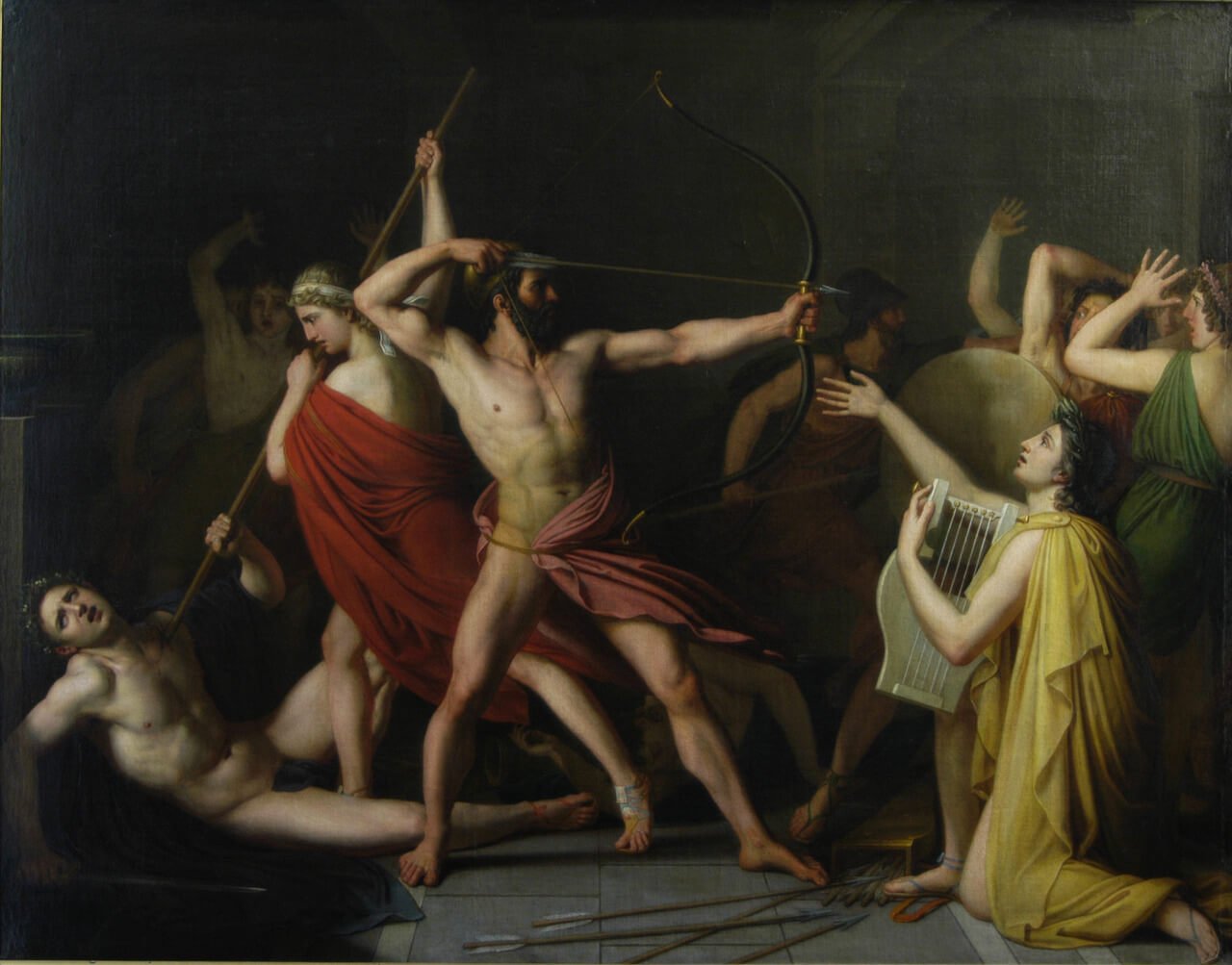
The arrow flew through all the twelve ax heads. The hero turned to the suitors and called them to a confrontation: “Ah, despicable swine! Didn’t you think, that I would never come back? That you would be robbing my house with impunity forever? No! Death awaits you all for this!”
The suitors rushed to arms, but they were not in the banquet hall. They ran from side to side and died from the arrows shot by Odysseus. In the meantime, Telemachus exterminated them with his spear, being helped in the fight by Eumaeus and the cowherd, Philoetius. None of the suitors survived; Odysseus had only spared the poet Phemius, who amused the swains with his songs. This is how the suitors received their punishing for all the outrages they had been committing along years.
Odysseus and Penelope
Meanwhile Odysseus was greeted by the servants who came running into the hall, after the murder of the suitors, Penelope couldn’t believe that the beggar resulted to be her long-awaited husband. Doleful, distressing doubts crept into her heart again. Thus, she called Eurycleia and ordered her to move the bed in their bridal room.
However, Odysseus emphasized such a task to be impossible, since he crafted the bed by himself and one of its legs was a living olive tree. Only the real king of Ithaca could have known the secret of the royal bedroom. For that reason, Penelope had finally recognized the stranger as her authentic husband and threw herself into his arms. Thereafter Odysseus and Penelope hugged each other and cried happy tears for a long time.
There were things to be told and stories to be narrated between the hero and his wife. Odysseus described his epic wanderings around the seas, depicting the dangers and villains, which he found on his way. In the meantime, his lovely wife Penelope listened to him faithfully and tenderly.
